These three letters were written by James Wilson Hanna (1843-1910), the son of Andrew Finley Hanna (1813-1847) and Susannah Craig (1817-1892) of Cadiz, Harrison County, Ohio. After his father died in 1847, his mother married Alexander Moore (1822-18xx) — a grocer in Cadiz. James graduated from Oberlin College with a law degree and took up the practice at an unknown location — possibly Pittsburg. For some reason, James Hanna enlisted with Co. G of the 10th Pennsylvania Reserves (39th Pennsylvania Infantry). They were organized at Camp Wilkins near Pittsburg in the summer of 1861 and were camped at Camp Tennally (near Tennallytown, Maryland) from 1 August to 10 October. They then moved across the Potomac River to Camp Pierpont until March 1862 when they moved deeper into Virginia and then participated in the Seven Days Battles on the Peninsula. Hanna was promoted to corporal in October 1862 but was discharged from the regiment on 26 January 1863.
In the summer of 1863, Hanna was back in Cadiz, Ohio, working as a bookkeeper. Perhaps Hanna was inspired by the heroics of the boy general, George Armstrong Custer, who grew up in nearby New Rumley, for it seems that late in 1863, he sought and received a commission as a Lieutenant in Company L of the 11th Ohio Cavalry commanded by Colonel William O. Collins (Bio. CO, p. 410; MCHS, Vol. I, p. 18; Riverside Cemetery, Denver CO). This regiment was sent to Colorado late in 1863 to fight Indians. Collins sent two companies from the 11th Ohio Volunteers Cavalry under the command of Captain William H. Evans to be stationed at Camp Collins [later the site of Fort Collins]. The camp was flooded shortly after the troops arrived. The camp was moved to the Joseph Mason claim on high ground above the Cache la Poudre River. Hanna served there until honorably discharged (Bio. CO, p. 410).
1899 “Colonel” James W. Hanna was Montezuma’s first representative to the legislature (Cortez Sentinel, October 17, 1983; Freeman, p. 66; Hall, Vol. 4, p. 230; Montezuma County Historical Society, Vol. I, pp. 68. 136). After he sold his Montezuma county interests, James W. Hanna moved to Denver and went into mining (Montezuma County Historical Society, Vol. I, p. 18).
James W. Hanna died on 1 December 1910, survived by his wife Anna E. Hanna, two daughters Jessie I. and Alice C. Hanna, and two sons Howard W. and Louis E. Hanna (“The Denver Times”, Saturday evening, July 23, 1910, p.4; Montezuma County Historical Society, Vol. I, p. 18).
Hanna wrote the letter to his friend, Richard (“Dick”) Lyons (1840-1902) of Cadiz, Ohio. Dick was the son of Robert Lyons (1803-1887) and Anna W. Bowland (1810-1844).
TRANSCRIPTION LETTER ONE
Camp Pierpont
October 17th 1861
Mr. Richard Lyons
Friend Dick,
I have been waiting ever since I left home to hear from you but I find that you are determined not to write until you hear from me, so this morning after breakfast I concluded to write.
Since I wrote home, our regiment has moved on this side of the Potomac [River] near a small village called Langley situated in Fairfax County, Va. We removed from our former camp at Tennally near Washington on last Wednesday. I was on the rear guard, however, & did not get here until Friday night as we had to remain & strike the tents.
We are now closer than ever to the rebels — they being only three miles off. It has been but a week or two since they were where we now are, but as soon as our boys advanced, they retreated.
Since we have been here, we have had several alarms caused by the enemy driving in our pickets, but we never went further than to load our guns & go out a mile or two as the rebels always run and never give us a chance to fight them. To a person that is not used to a soldier’s life, they would be surprised to see how careless & unconcerned we are when called out to fight. As soon as the boys hear the long roll beat, they begin to yell & are perfectly frantic with joy at the prospect of having a skirmish with the bloody secessionists. We can often hear the drums beat in the rebel camps, and our Capt. was out a short distance from camp the other day and saw a large body of them a good distance off.
Dick, you may talk as you please about camp life being a hard one, but as far as I am concerned, I can say that I never had better times than since I have been in the army. It is true we have some rough times, but we must expect too. But as a general thing, we have splendid times. Nothing to do but drill a little, then lay around & sleep or do as you have a mind to. Yesterday one of my mess mates went out & stole a haversack full of turnips and this morning we had them for breakfast. Today he & I intend to go to the same place and get some cabbage.
Our mess was busy all day yesterday in fixing our tent. We put a bottom in it with rails. These we covered with hay and made a bed that I would not exchange for a feather one. I wish some of you Cadiz boys were here & we could have a gay time.
While in Washington the other day, I saw Ward Patterson. He is Sec. for Gen. Sickles. Has Alb. George ¹ returned yet from war? What sort of a time had you at the time of the fair? Write & tell me all the news. I received a letter from Parker the other day. Will answer soon. Write soon.
I remain yours &c., — Jas. W. Hanna
Address: J. W. Hanna, Co. G, 10th P. R. C., Washington D.C.
¹ Albert George of Cadiz, Ohio was a member of the 30th Ohio Infantry.
TRANSCRIPTION LETTER TWO
Camp Pierpont
March the 9th 1862
Dear Sister,
I received your very kind and welcome letter of the fourth on the evening of the seventh and was very glad to hear from you but was sorry to hear of Father’s illness but hope ere this reaches you that he may be better. My health is very good and so is all the rest of the company with a very few exceptions.
This is a beautiful warm, sun shiny day and things look a good deal like spring. Professor Vincent of New Wilmington preached for us near the quarters today. His text was on the crucifixion of Christ and he preached a very interesting, good sermon. He is out on a visit to the 10th Regiment and there are some boys in our company here now.
I see you had to saddle up Gray Ned as you call him and start out and hunt a beaux before you could get one so you need not brag about it. But one thing I can assure you of, you have one here that is true to you. Him and I have many a good long chat about old times. We would of liked to of been at Nick’s party and put some of the women through and seen if we could of put an around them. Some folks change their opinion often. Just between you and I, she has since the war broke out. Her brother is here driving sutler team for Jim Clark, our company sutler, and those Damascus girls—I would like to see them if they are pretty but you are now [too.] The ladies never attracted my attention much and they are still less attractive since I have been soldiering. This page, keep to yourself.
I was at the city yesterday and searched ever warehouse and freight and express office that I could find in town but could not hear anything of it. I am sorry that we can’t get it after your folks going to so much trouble but we may get it yet. But if we don’t, we will be just as thankful to you all.
We still get encouraging news. Col. [John W.] G[e]ary has taken possession of Leesburg. He did not have to fight any to get it. Our troops came in at one side and theirs went out on the other side.
We are under four days rations to be ready to march but marching orders but everyone that I hear speak about it would like to march on now when they are started and rout them as we go. I for one would like to be doing something. The more I hear of them, the more I want at them.
I am on guard last night and today and I am a little sleepy and lazy and you will have to excuse me. It is now three o’clock and I must put on the relief and finish this again/
Well, this is Monday morning and it is raining. The mud was getting pretty well dried up but this will make it as bad as ever. The turnpike is dry and nice from here to Washington.
There was a man killed here in the Seventh Regiment last week. A tree blew down across his tent. Clark is washing the dishes here on the bunk. We use it for eating on, writing on, and sleeping on. We have things handy here. We have a strap tacked on the log to stick our knives, forks, and spoons, and one for our tin plates and that serves for a cupboard.
Tell Millia that John Williams was so taken with them pictures that he had to kiss them. I do not know whether he would kiss the real person or not if he had a chance. John is a first rate boy and makes a good soldier. Clark says to give you his compliments in return. I have not much news to write. I write pretty often so you will please excuse me for not writing a very interesting letter. The money I sent you, you are perfectly welcome to and I still consider myself indebted for favors done.
My love to all. Yours truly, — Jim
If we are taken out into a battle, I will write as soon as I can. Sometimes we cannot have an opportunity right away so you need not be uneasy. Write as soon as convenient. I must write some foolishness.
TRANSCRIPTION LETTER THREE
Catlett’s Station, Farquar County, Virginia
April 29th 1862
Friend Dick,
I don’t know whether I owe you a letter or you owe me one, but it matters not, for I have time now & will write and all I ask you to do is to hold by my example & in case I do not answer you as promptly as I should, do like me & write twice.
Well, Dick, I am still a soldiering, though much harder work it is than when I last wrote you which, I believe, was at Camp Pierpont. You remember when I wrote you that I told you we expected to move soon, and we did for the next Monday we received orders to go to Manassas — which at that time was in possession of the rebels. We started on the 10th of March & expected to have a hard fight, but when we got within five miles of Centreville, we heard much __ disappointment, that they had evacuated & gone to Richmond, & of course we went no farther, but were ordered back to Alexandria to go on board of a fleet, & had we been in time, would now have been before Yorktown, but through some mistake of our General (who at ____ was drunk) we were too late in getting there and other troops took our place. We remained near Alexandria three weeks when we were ordered to Manassas & from Manassas to Fredericksburg, to which place we are now on the road, & when we once get there, we will only be two hours ride from Richmond, which is only sixty miles distant.
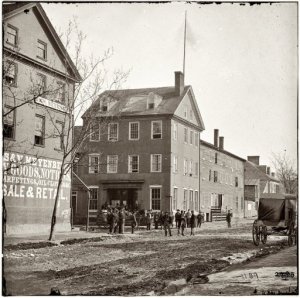
Marshall House at the corner of King Street and Pitt Street in Alexandria where Col. Ellsworth was killed.
While near Alexandria, I often went down to the city. It is a hard-looking place — a good deal like Steubenville; only there are a great many more deserted houses & the people (that was left) appear to be all secessionists & are only kept down by the soldiers. I went to see the Marshall House where Ellsworth was killed. It is a common three-story brick & looks a good deal like the National in Cadiz. The stairs on which he was shot have all been cut away by visitors as souvenirs, & new ones have been put up.
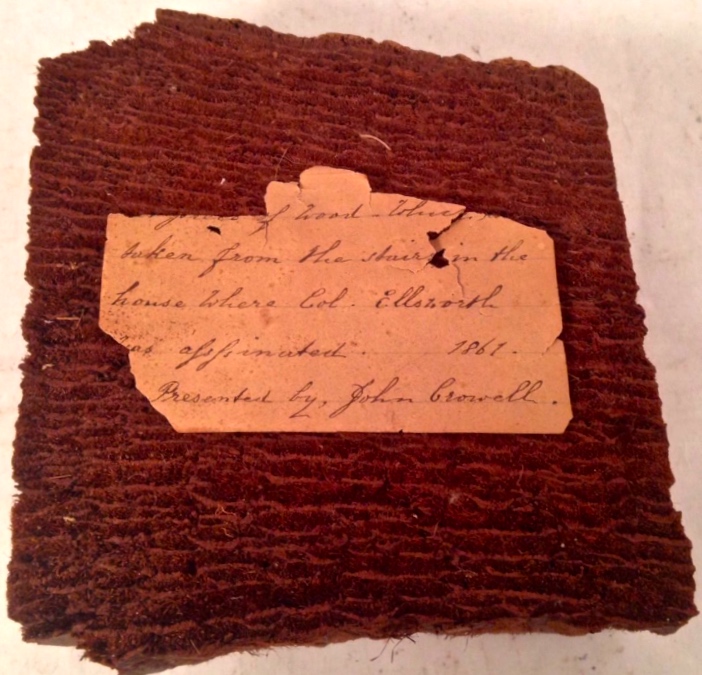
A piece of the Marshall House staircase taken by Massachusetts soldier John Crowell as a relic. Sold in February 2015 on e-bay for $332.
The town [of Alexandria] is full of women, but as a matter of course, where there are so many soldiers the principal part are whores & you can get what you want from ___ ___ ten dollars, but for my part never indulged for [illegible] certain death.
While at Alexandria, I saw A___ Vincent. He looked first rate & makes a good officer. He spent one afternoon with [illegible…] McClellan, at least he [illegible…].
I was also at Washington & staid one night with Geo. Finney. George is quite lonesome & sad. He would like to be back in Cadiz. The rest of Finney’s family are all well & A. G. looks as fat as a hog.
From Alexandria we went to [illegible]. We staid there one week & while there were quartered in some wooden barracks formally used by the 9th Massachusetts Regiment & they were the best quarters we have been in since we have been in the service, not excepting those at Camp Wilkins.
On our way to Manassas, we passed through Fairfax Court House, Centreville, & crossed Bull Run. Fairfax Courthouse, you know, is noted for the famous cavalry charge made by Lieut. [Charles Henry] Tompkins last Spring. It is a small village of about 300 inhabitants — mostly secesh. It has but one street & looks a good deal like New Athens.
Centreville is situated on a high hill & has a commanding position & was considered the stronghold of the rebels. It only has about twenty frame buildings & the place looks like the headquarters of some large coal bank similar to those at Steubenville. The place is well fortified by embrasures, breastworks, & rifle pits & from its situation, would be hard to take if [ ] many men & command to defend it, but when we passed through, the guns had all been taken away save those {Quaker guns} that were still sticking out of the embrasures which at a distance [looked like] real guns. From the number of barracks about Centreville, I think the main body of the rebels were here last winter as there are any number of buildings.
From Centreville to Manassas it is five miles & our company had to cross Bull Run. This is a much larger stream than I expected to find it. It is as large as the Tippicanoe & is very ___. From the run to the junction, it is three miles & more to my surprise (from account in the papers) through as pretty a country as I ever saw, being very level & rich soil, though you could see from the ___ &c. that there had been a battle there.
We got into Manassas Saturday afternoon [illegible…] its impregnability & in fact, I did & I know the majority of the soldiers believe that it was almost certain death to try to take Manassas. I imagined that it [Manassas] was situated between two larger mountains & for miles you had to pass through a ravine lined with masked batteries & at the end was a larger fort with hundreds of guns with which they would hurl death & destruction upon us. “But Alas! how are the mighty fallen.” Instead of all this, you would not know that that had been the Gibraltar of America, as it is, or was, a place of only some seven brick houses & is only level ground, & has no practical advantages at all. There are several small forts & numberless breastworks and rifle pits, but these could easily be taken by [illegible…] that keep us from leaving it long ago, was we were scared by the reports. There were also a great many barracks here but I think Centreville was much stronger fortified. The rebel [illegible…] [burned?] the principal buildings, but left the wooden barracks & when our troops went there, men quarters in them.
The next day after we arrived at Manassas, I went down to the Bull Run Battlefield which is five miles from the station. I expected to see a rough-looking place, but instead found as fine a battlefield as could be expected & far better than the [illegible]. The place where the main part of the fighting was done was one large field two or three miles long & very level [illegible] — something like the fairground but not so hilly, & offering no more advantage to one than to the other & I think that our fellows were fairly whipped, caused by becoming panic stricken, aided by the transfer of regiments of Johnson’s. I went over to that point of the field where the Black Horse Cavalry made their charge on the [Fire] Zouaves & were so badly cut up. The cavalry came out of a small patch of woods just as our fellows were coming up a little hill towards them near where they met. The ground was covered with bones of horses & old uniforms of the Zouaves. I think judging from the number of horse skeletons that the B.H.C. was badly used up.
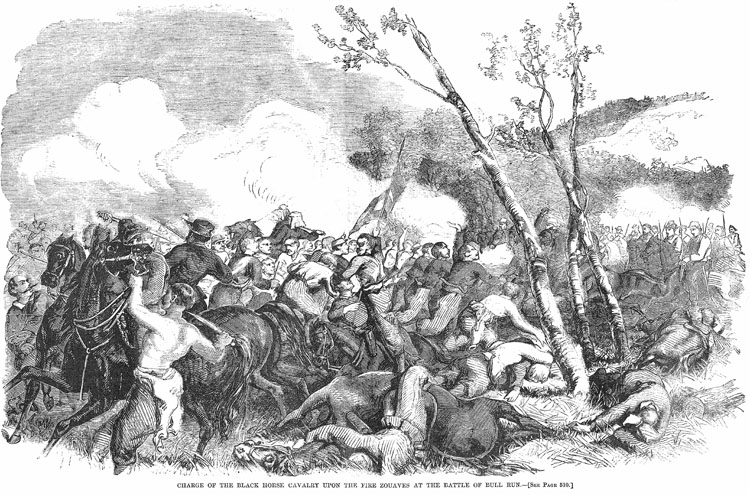
The 11th New York Infantry (a.k.a., the “Fire Zouaves”) under attack by the Black Horse Cavalry at First Bull Run, 21 July 1861
On one part of the field I saw a monument erected by Beauregard to the memory of a rebel general. On it was the following inscription, “Boys, they have killed me, but don’t give up the fight.” At the time I saw it, it was standing & whole, but after a short time, I saw that it had been torn down & the boys were busily at work smashing it in pieces for mementoes. ¹
The dead appear to have been poorly buried & in several places I noticed the bones sticking out of the ground & scattered all over the field. However, bones could be seen that had never been buried but left to bleach on the plains of Manassas.
And now, before I leave Manassas, allow me to say a word about how they [the rebels] were fed & lived. You know that our papers represent to us that they were poorly fed & cared for, but that is all false. I believe they were as well fed as we & perhaps better for where ever we have been in places they have left we have found any amount of pork, beans, coffee, sugar, rice, corn, oats, potatoes, &c. &c. In fact, everything we have in abundance. As for their quarters, they were as much superior to ours as a cowshed. While we were suffering in our tents last winter with cold, they were comfortable, situated in good log houses which they had built, built of boards & shingles. Beside, they had plenty of wood & room. Four of us were stuck into a little piece of canvas 8 X 10 feet while they had a house 16 X 16 for six. They do not appear to have been as well clothed as we are, but in every other respect, they fared as well & better as when they was ___. They rode on cars while we take _______.
From Manassas we were ordered to Fredericksburg on the Rappahannock but we only got twelve miles when we had to stop on account of the weather which has been very bad for a week, rendering it almost impossible to move. But it is now pleasant & we expect to go this afternoon or tomorrow. It is thirty miles to the river & will take us two ays to go there. but when once there, we will have good times or they [illegible] … is noted for its pretty women & that’s something I have not seen since I left home & did not expect to [illegible] them short of Richmond where I expect to be before long. And I think my next letter will be dated there — at least I hope so. That you may… [illegible] just see where McDowell’s Corps is for we are in Fredericksburg & the first brigade of our division went yesterday. We are very much encouraged by our successes down south and begin to think that we will be home soon. Our corps & Banks’ expect to join at Fredericksburg and go into Richmond which is only sixty miles from there. I have not heard from Cadiz for some time, but am very anxious to hear as I want to know how our company fares that was in the fight at Pittsburg Landing [Shiloh].
Now, Dick, I want you to write & tell me all the news. Tell F____ to write as he owes me a letter. Why don’t Alex. Clemens write? The mails here are very irregular & there is no telling when we can send out a mail as we are now in the enemy’s country & it is not safe to go often. Write soon. Give my respects to all the boys.
Direct as usual. I remain yours &c., — Jas. W. Hanna
¹ This marker was erected to the memory of Col. Francis S. Bartow who commanded the 7th & 8th Georgia at the First Battle of Bull Run. On September 4, 1861, before a crowd of 1,000 people, the first Confederate-dedicated monument was inaugurated at Manassas, honoring Francis Bartow. An obelisk made of marble, it was later destroyed by Union forces.
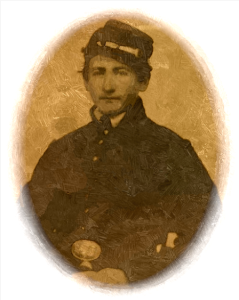





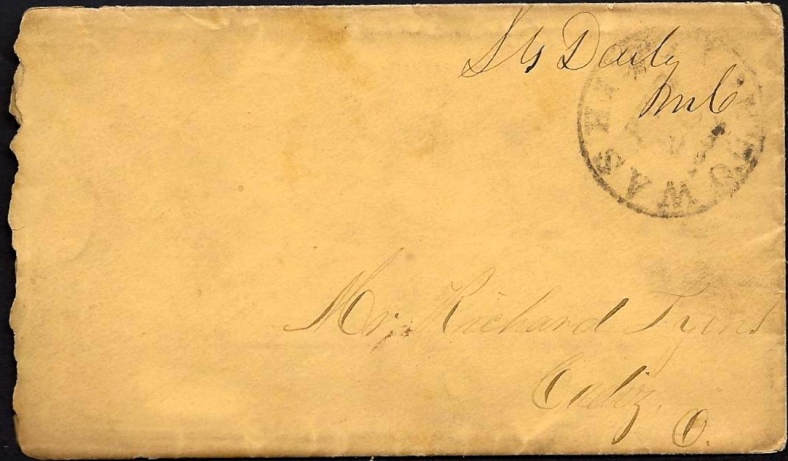
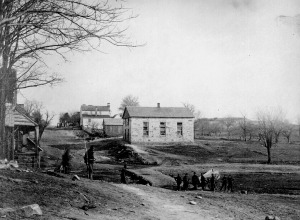






One thought on “1861-62: James Wilson Hanna to Richard Lyons”